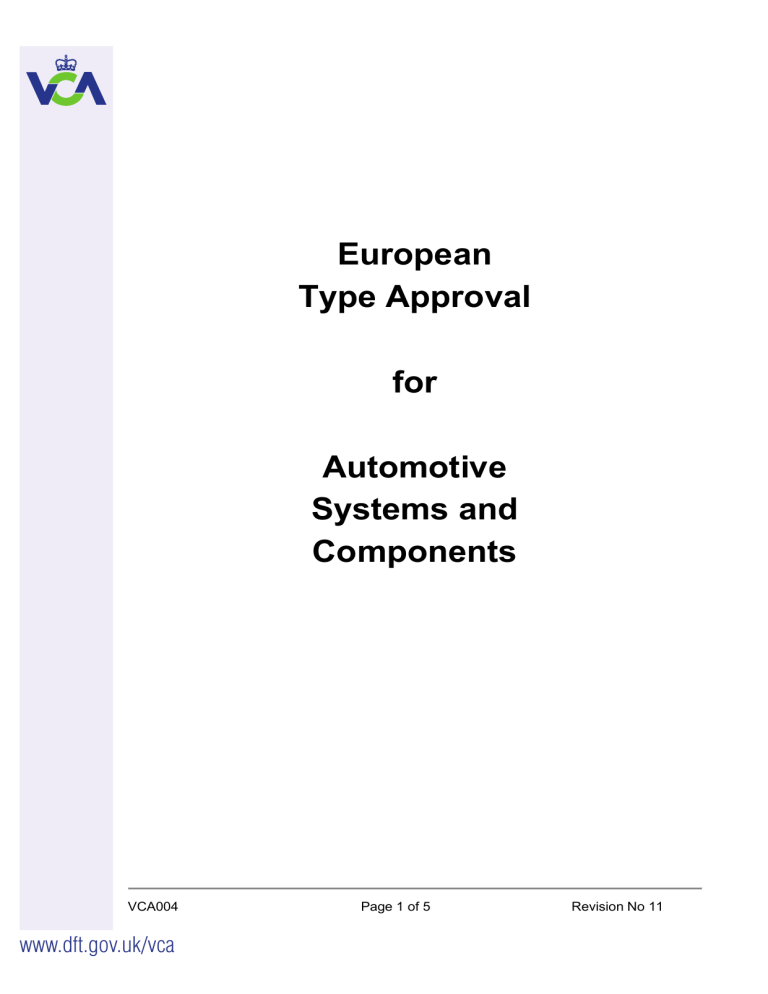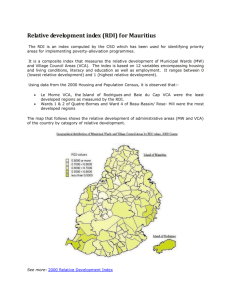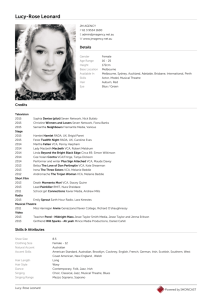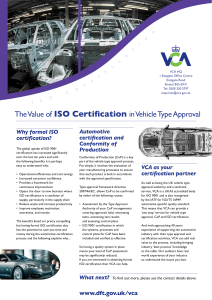European Type Approval for Automotive Systems and Components

European
Type Approval for
Automotive
Systems and
Components
VCA004 www.dft.gov.uk/vca
Page 1 of 5 Revision No 11
About VCA
The Vehicle Certification Agency (VCA) is an Executive Agency of the United Kingdom
Department for Transport, charged with operating the system of automotive type approval in the
UK. VCA is the designated UK Approval Authority and a Technical Service for all type approvals to automotive EC Directives and most United Nations (UN) Regulations. VCA is accredited also, by UKAS for the issuing of ISO 9001 quality management systems certification,
ISO 14001 environmental management systems certification, OHSAS 18001 health and safety certification, and EMAS verification. Additionally, VCA is recognised by the International
Automotive Task Force (IATF) through the Society of Motor Manufacturers and Traders Limited
(SMMT) for ISO/TS 16949.
1. Introduction
Many industrial sectors are subject to some form of approval or certification system but road vehicles are a special case, because of their importance to and impact upon society, and have been subject to specific technical standards almost from their first invention. Within Europe, two systems of type approval have been in existence for over 20 years. One is based around EC
Directives and Regulations, and provides for the approval of whole vehicles, vehicle systems, and separate components. The other is based around UN Regulations and provides for approval of vehicle systems and separate components, but not whole vehicles.
2. What is Automotive Type Approval?
Put simply, type approval is the confirmation that production samples of a design will meet specified performance standards. The specification of the product is recorded and only that specification is approved.
Automotive EC Directives and UN Regulations require third party approval - testing, certification and production conformity assessment by an independent body. Each Member State is required to appoint an Approval Authority to issue the approvals and a Technical Service to carry out the testing to the EC Directives and Regulations. An approval issued by one Authority will be accepted in all the Member States. A similar situation exists for UN regulations where
Contracting Parties have similar role to the EC Member States.
In the UK, the Vehicle Certification Agency (VCA) is both Approval Authority and Technical
Service.
(Note: automotive Directives are "old approach" in terms of requiring third party testing and approval. "New approach" Directives follow a different format and place more obligation on the manufacturer to make sure that the product meets appropriate requirements. EU Member
States have agreed that the new approach is not appropriate for road vehicles.)
2.1. Whole Vehicle Type Approval
EC approval of most road vehicles is based around a "Whole Vehicle" framework Directive
2007/46/EC (as amended) and this specifies the range of aspects of the vehicle that must be approved to separate technical Directives. Hence, in order to gain EC whole vehicle approval, a vehicle first will have to be approved for various systems, e.g. brakes, emissions, noise, etc.
The issue of the whole vehicle approval does not in itself involve testing, but a production sample of the complete vehicle is inspected to check that its specification matches the specifications contained in all the separate Directive approvals.
Page 2 of 5 Revision No 11 VCA004 www.dft.gov.uk/vca
Broadly, the Whole Vehicle framework document covers any vehicle with 4 or more wheels and their trailers intended for use on roads, except agricultural or forestry tractors, mobile machinery, and vehicles with a design maximum speed of less than 25kph.
There is a separate framework Directive, 2002/24/EC (as amended), that covers 2 and 3 wheeled vehicles and 4-wheeled quadricycles. Agricultural or forestry tractors are covered under a further framework directive - 2003/37/EC (as amended). Both of these follow the same principles and processes as the car framework directive.
2.2 System or Component Approval
The separate technical Directives and Regulations allow (or require) the approval of individual systems as part of a type of vehicle and some allow for the approval of separate devices. A separate device may be approved either as a Separate Technical Unit (STU), in which case the vehicle to which it is to be fitted must be declared, or as a Component if it can be fitted to any vehicle. System and component approval requires that a sample of the type to be approved is tested by the Technical Service to the requirements of the relevant Directive. Its technical specification is documented and that specification forms part of the approval.
3. System or Component Approval – The Process
3.1. Application
The manufacturer should apply to VCA in writing for the work to be done (addressed to
Administration Supervisor, Product Certification Branch) which will set the process in motion. If one of VCA's independent Technical Service laboratories is to be used for the testing (see below), then contact with the laboratory can be made direct.
Once the application is received, you will be sent notification of the VCA job number (which should be used in all future correspondence with VCA) and the name of a contact VCA test manager.
3.2. Worst Case Selection
When you are ready to proceed you should contact the VCA test manager notified to you and arrange for a "worst case" meeting.
VCA practises worst case selection prior to testing in order to reduce the amount of testing needed across the range of a product type. A meeting will be held between VCA and the manufacturer in order to consider the products to be tested, the tests to be carried out, and the date and venue for the testing. The manufacturer may present results of in house testing, and any other information, in order to assist the worst case selection.
3.3. Testing
VCA is the UK automotive approval Authority and a Technical Service so has the responsibility for witnessing or carrying out the tests as well as issuing the approval certificates. Tests can be witnessed at any suitable facility anywhere in the world, whether they are owned by the manufacturer or hired by the manufacturer for the period. To enable us to offer our services locally, VCA has resident staff at offices around the world, including the USA, Japan, Malaysia,
Korea, Italy, Australia, India, Brazil and China.
Any facility to be used must first be appraised by VCA to ensure that the equipment is appropriate for approval testing, and this can be arranged as a separate exercise or as a prelude to a test programme. VCA appraisal techniques follow established quality principles.
Page 3 of 5 Revision No 11 VCA004 www.dft.gov.uk/vca
If preferred by the manufacturer, VCA can provide a full service including the provision of instrumentation and test facilities. This would normally be done through our UK VCA Midlands
Centre at Nuneaton, using MIRA facilities.
For certain subjects, VCA has appointed independent laboratories to act as Technical Services
(in addition to VCA):
These can be found on the VCA website: http://www.dft.gov.uk/vca/vehicletype/technical-services.asp
3.4. Documentation
Prior to testing the manufacturer will be required to submit technical documentation that adequately specifies the product in terms of the elements of the design that are relevant to the legislative instrument concerned. These documents act as a check list for the sample of the product that is provided for testing and, after test, as the basis for the approval itself.
If necessary, further, good quality final information documents may need to be supplied for attachment to the approval certificate.
3.5. The “Manufacturer” and Conformity of Production
(CoP)
For each approval it is necessary to declare a manufacturer for the product. This does not necessarily have to be the company that actually manufactures the product but it must be a company that can take, and prove, responsibility for the design and manufacture and hence can control conformity to type of production samples.
It is unlikely that an independent importer could take on the role of manufacturer but it could be the appointed manufacturer's representative for the approval. Note, though, that a product can hold only one approval from one Authority, so an importer will need to ensure that it alone is acting for the manufacturer.
Conformity of production requirements are based around established quality systems principles, and certification to ISO9001 may be acceptable as a basis, with appropriate control plans to deal with the specific approval aspects. It may be necessary for VCA assessors to visit the production facility and so it is important to involve VCA at an early stage.
The COP process can run along side the testing process, in order to avoid delays, and will be triggered by the application letter to VCA.
3.6. Approval Issue
Once all the technical documentation and test reports are complete, and conformity of production clearance has been given, VCA will complete the approval package by issuing an approval number, an approval certificate, and an index to the manufacturer's documents, and.
Each month we notify all the other Approval Authorities of the approvals that we have issued so that they can check the number should the manufacturer wish to use the approval overseas.
3.7. Specification Changes
The specification of the product is frozen in the approval. If the specification changes then the
Approval Authority must be informed of the change.
Page 4 of 5 Revision No 11 VCA004 www.dft.gov.uk/vca
It should be noted however, that a change to the specification of a product does not necessarily mean more testing or a new approval. If the change is minor then we may be able to add it to the approval as a document review exercise. If the change affects information on the approval certificate then an extension certificate must be issued. If it affects only the information in the manufacturer's documents then we will issue a revised index of those documents, with no change to the approval certificate.
4. VCA Fees
VCA fees for approval work are charged on the basis of the time taken to carry out the work, but we will endeavour to provide an estimate of the likely fee once the work content has been agreed.
Note that different arrangements will apply if one of VCA’s appointed technical Services is used.
5. Contact us
For contact details around the world, go to: http://www.dft.gov.uk/vca/world-map.asp
VCA004 www.dft.gov.uk/vca
Page 5 of 5 Revision No 11


